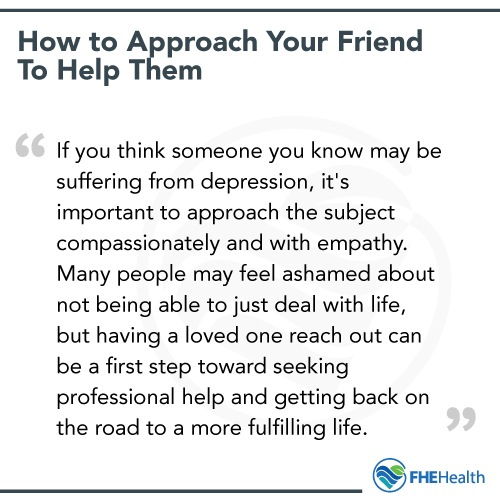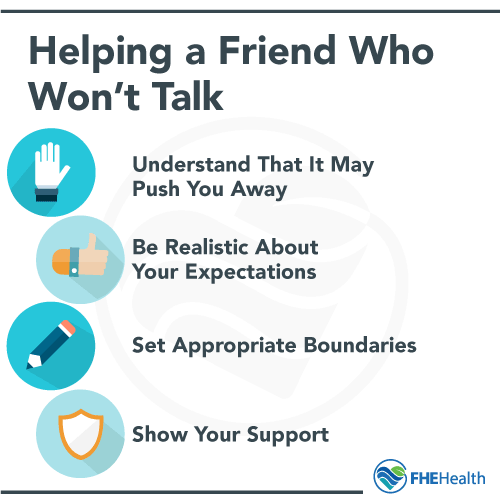
Maybe you’ve noticed that a friend or loved one doesn’t hang out as much as they used to or they always have an excuse for why they can’t join in on social outings. Or maybe you’ve seen a decline in caring about personal appearance or the cleanliness of their home. While everyone has busy stages of life where you skip hair washing day or don’t get to the dishes or laundry, these can also be warning signs that someone is struggling with depression.
It’s normal to be unsure of how to talk to a person with depression without making the situation worse — comments like “just cheer up” or “I don’t understand why you think your life is so bad” aren’t helpful — but there are some things you can do to be supportive during this time. Understanding how depression works and how it affects a person’s life is the first step in figuring out how to help a depressed friend who won’t talk.
How to Help Someone with Depression Who Won’t Talk
Everyone has had a bad day, been in a bad mood or experienced a difficult time in their lives, but this isn’t the same as being depressed. And if you’ve never experienced a major depressive disorder, it can be very difficult to understand how it affects everything in your life and can make even the smallest tasks difficult. Some common, but not so helpful ways, people may try to cheer up a depressed person include telling them the situation isn’t as bad as it seems, acting as if they can just magically get out of depression with the right playlist or a walk around the block or trying to commiserate too much and end up enabling the person into even more negative behaviors.
While these are all usually done out of concern for your loved one, it can be very frustrating when people with depression aren’t getting better. The truth is that depression is isolating and can be a very complex mental health condition. It requires a combination of various therapeutic techniques and often medication to start seeing an improvement in symptoms of depression.
However, this doesn’t mean that you can’t still be of help. Here are some ideas on how to help a friend with depression.
Understand That They May Push You Away
One of the most frustrating aspects of trying to help someone with depression is that they may push you away and seem like they don’t want or appreciate your efforts. If you’re taking time out of your schedule and trying to prioritize their needs, you may start to feel used, taken advantage of or unappreciated. However, it’s important to understand that pushing people away is a big part of struggling with depression.
It could be that the person is ashamed and doesn’t want you to see how bad things have gotten from a life-management perspective, or they could be struggling with poor self-esteem that makes them feel like they’re a burden on others or are unworthy of help. The best thing you can do in these situations is to keep reaching out without being pushy — call to check in but don’t guilt-trip the person into coming out with you for coffee — and remind them that you love them, care about their well-being and are there whenever they’re ready.
Be Realistic About Your Expectations
Dealing with depression is exhausting, and it can make something even as small as taking a shower seem insurmountable, which means it’s essential to be realistic about your expectations when it comes to how someone manages their mental health. Doing a load of laundry and putting it away could be a huge achievement for someone struggling with depression, and it’s important not to negate these triumphs as just being “normal things.” Even those who are actively dealing with their depression will face setbacks, as depression is the same as any recovery process in that it’s not linear. You may wonder during these times whether your friend will be OK or what is a normal life difficulty and what requires intervention, but the best thing you can do to support someone with depression is to keep the lines of communication open. This way you are aware of what’s going on and the other person has the best chance of feeling comfortable talking to you about it.
Set Appropriate Boundaries
When trying to figure out how to help a friend with depression, the focus, understandably, becomes very much on them, but it’s also critical to protect your own mental health. Being a support person is fine, but it shouldn’t be at the sacrifice of your own work, personal or social life, and it shouldn’t cross over the line into enabling.
Before you get too involved in someone else’s life, take time to reflect and create some ground rules for yourself about how you’ll handle certain situations and how much you want to be involved. You may also consider what you’ll do if the other person doesn’t want your help or isn’t interested in trying to affect change in their own lives, because that’s a critical first step in dealing with a mental illness such as depression.
Show Your Support

Depending on the person’s situation, you could also offer to pitch in with some laundry or bring over dinner one night, but it’s crucial not to suffocate the person either. You want to show that you’re there to help but still respect that they are an adult who has the right to their own life choices.
If you think someone you know may be suffering from depression, it’s important to approach the subject compassionately and with empathy. Many people may feel ashamed about not being able to just deal with life, but having a loved one reach out can be a first step toward seeking professional help and getting back on the road to a more fulfilling life.
FHE Health has mental health professionals on staff who can help those suffering with depression start getting back to their lives and assist those around them understand how to be as supportive as possible. If you or a family member is seeking treatment, contact FHE Health and we would be happy to help.







